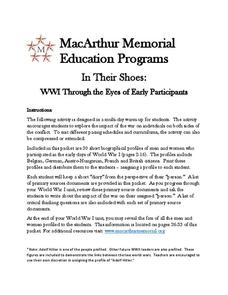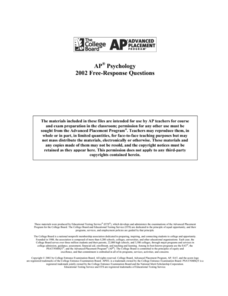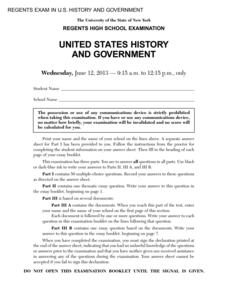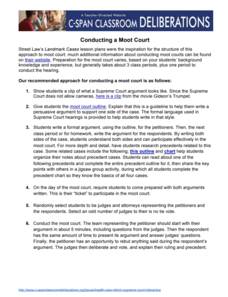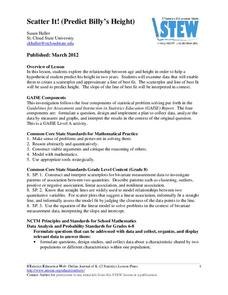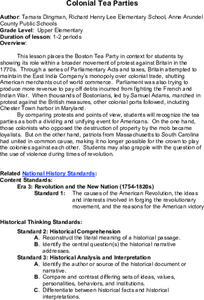MacArthur Memorial
In Their Shoes: WWI Through the Eyes of Early Participants
Several social activities provide showcase the perspective of many prominent figures in World War I history. Students read an assigned case study about a memorable person and complete several activities to further understand this...
College Board
2000 AP® Psychology Free-Response Questions
The New York City police chief wants to know if teens commit more crimes after watching violent television shows. What kind of study helps answer the question? Learners must describe a successful study. They also examine the...
DocsTeach
Environmental Case Study: Hetch Hetchy Valley
What is more important: building a new school or preserving a nature reserve? Keeping a natural area clean or providing clean drinking water to a city of millions? Young scholars weigh these questions—almost literally—using an...
College Board
2002 AP® Psychology Free-Response Questions
A child tells a story of her visit to a fire house. How does her cognitive development impact how she remembers what she saw? Scholars explore a case study and a second prompt about psychological reactions using authentic College Board...
Curated OER
Time Is On My Side! Again!
Fourth graders evaluate their current test-taking and studying skills. In groups, they read a case study in which they create a time schedule for a week. They color code the scheduled and unscheduled activities for Frantic Fred and share...
Center for History Education
Cold War Case Files: The Rosenberg Trial - Was Justice Fairly Served?
The Rosenbergs—executed for their role in a Soviet-era spy ring—continue the captivate the American imagination. Using a history lab format, young historians examine the trove of documents associated with the case, including photographs...
Heritage Foundation
Courts and Judges
If the Supreme Court is so supreme, why do all cases not just start there? High schoolers learn why every case does not start at the Supreme Court as well as the importance of hierarchy in the US judicial system in the 11th installment...
Heritage Foundation
Procedural Amendments: Amendments III, IV, and V
So many US Constitution clauses, so little time. The 17th installment in a 20-part series teaches pupils about the Third, Fourth, and Fifth Amendments. Learning through activities such as group work, connecting to current events, and...
iCivics
Supreme Decision
Is the right to wear a band t-shirt included in our freedom of speech? Budding historians consider the question by using a video game. After a brief animated video, users drop in and listen to Supreme Court justices as they debate the...
Constitutional Rights Foundation
Why We Have Freedom of the Press
A newspaper receives documents that reveal not only a devastating secret the public needs to know, but also troop movements that could put American lives at risk: to publish or not to publish? Using background readings, discussion...
Prestwick House
The Strange Case of Dr. Jekyll and Mr. Hyde
The Strange Case of Dr. Jekyll and Mr. Hyde is a strange tale indeed, but a crossword puzzle based on Robert Louis Stevenson's classic story is pretty straightforward. Help learners review key facts and quotes from the book in a quick...
National Center for Case Study Teaching in Science
In Sickness and in Health
Based on family history, how likely is it that a couple's children will have a recessive disease? In an in-depth, but easy-to-follow case study, future geneticists learn the story of Greg and Olga, who are hoping to have children, but...
Cornell College
Dred Scott v. Sandford Supreme Court Decision
Dred Scott was a harbinger of the Civil War. An enslaved man claimed freedom because his owner had taken him into free territory. Not only did the Supreme Court rule that Dred Scott and his wife were to remain enslaved, but it also ruled...
Facing History and Ourselves
Life for German Youth in the 1930s: Education, Propaganda, Conformity, and Obedience
The German youth faced an onslaught of propaganda when they went to school, thanks to the Nazi regime led by Hitler during World War II. Pupils relate their education experiences to German youth by analyzing primary source readings,...
PBS
Analyzing McCulloch v. Maryland
What happened in the Supreme Court case of McCulloch v. Maryland? The resource teaches the specifics of the case with a video and provided discussion questions covering issues such as precedent and the Supreme Court as an equal branch of...
PBS
The Supreme Court: Liberty of Contract
How did the Supreme Court apply the Fourteenth Amendment to cases involving working people? Learn all about labor rights in a resource that focuses on the liberty of contract and protections for workers. Scholars complete handouts that...
New York State Education Department
US History and Government Examination: June 2013
How successful has American foreign policy been in the past? Pupils consider the question as part of a state examination in American history. Other prompts include a document analysis and essay of important civil rights cases decided by...
C-SPAN
Conducting a Moot Court
Review the conduct of different roles within the Supreme Court. A moot court activity educates learners about the roles of each member of the court and the process of a case with video clips, research activities, a graphic organizer,...
PBS
Explicit and Implicit Language – Interpreting the Meaning of the Fourteenth Amendment
How do Supreme Court justices interpret amendments to the Constitution? The resource helps answer that question by discussing how people use explicit and implicit language to interpret the meaning of the Fourteenth Amendment. Learners...
National Endowment for the Humanities
People and Places in the North and South
North and South: two opposite directions and two opposite economic and social systems in time of the Civil War. Pupils peruse census websites and primary source photographs to understand what life was like for the everyday person before...
Council for Economic Education
Satisfaction Please! (Part 3)
Understanding the US government's role proves very important in the American economy, especially for consumers. Scholars learn about how varying government agencies help them when facing an issue. The third and final resource in the...
Constitutional Rights Foundation
The Role of the Judiciary
The role of the judicial branch has far reaches into American life. Learners consider its uses with a reading on the branch and a structured conversation on the topic. Together, they work to root their contributions to the discussion in...
American Statistical Association
Scatter It! (Predict Billy’s Height)
How do doctors predict a child's future height? Scholars use one case study to determine the height of a child two years into the future. They graph the given data, determine the line of best fit, and use that to estimate the height in...
Center for History Education
Colonial Tea Parties
Most people know of the Boston Tea Party, but it was only one of similar protests throughout the colonies. Using a case study from Maryland, learners explore primary sources, including images and newspaper accounts of similar tea...
Other popular searches
- Case Study on Brainstorming
- Case Study Heredity
- Federalism and Case Study
- Refugee Case Study
- Time Management Case Study
- Case Study Macro
- Business Case Study
- Family Law Case Study
- Marketing Case Study
- Ethics Case Study
- Earthquakes Case Study
- Market Structure Case Study


